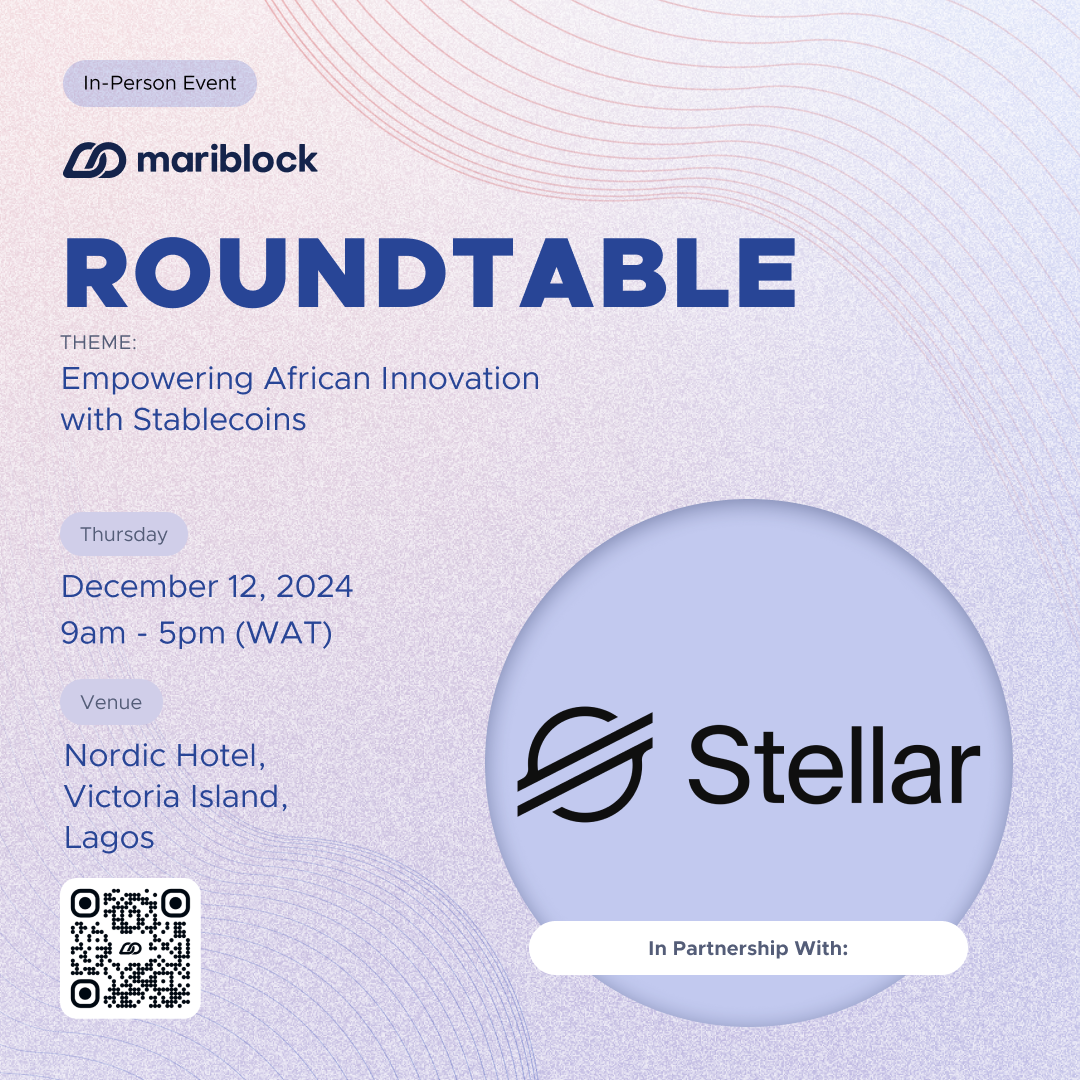Mariblock Roundtable: Stablecoins and Africa’s financial future
The first-of-its-kind event is set to bring together blockchain and fintech professionals to discuss emerging trends around stablecoins in Africa.

Africa-focused blockchain information company, Mariblock, is hosting the first edition of its think-tank event. Dubbed the Mariblock Roundtable— Stablecoin Edition, the event is designed to provide a platform for fintech professionals, blockchain ecosystem players and stablecoin providers to share ideas on how stablecoins are shaping Africa’s financial future.
Dive deeper
- The event, headlined by Stellar Foundation, is scheduled to take place on December 12 in Nigeria’s economic capital, Lagos and will parade some of the continent’s big brains in finance, blockchain and stablecoin technology.
- In the lineup of speakers to share insights at the roundtable are Stellar’s director of product and institutional assets, Paul Wong and Busha’s compliance lead Theophilus Oladipo.
- Other speakers at the event are Quidax’s Daluchi Iweanya, Mansa’s duo of Mouloukou Sanoh and Nkiru Uwaje, Abdulfatai Suleiman of Blockradar and Scalex’s Nnaemeka Nwosu.
- These speakers, among others, are due to speak on issues bordering on real world stablecoin use cases, regulatory compliance, Africa-tailored stablecoin solutions and real-world assets.
- The event, which also features a breakout session, includes spotlight forums and product demonstrations from selected blockchain companies.
Key quote
- Mariblock's lead editor, Oluwaseun Adeyanju said:
"At Mariblock, our top priority is facilitating productive, high-value conversations that drive progress in the African blockchain space. The Mariblock Roundtable, a cornerstone of this commitment, is poised to become the continent’s most-recognized forum for impactful dialogue, driving the future of blockchain innovation."
Why this matters
- Per the blockchain analytics firm, Chainalysis, stablecoins accounted for 43% of the total cryptocurrency transaction volume in Sub-Saharan Africa between July 2023 and June 2024.
- Last year, Mariblock reported that several crypto exchange operators informed it that a significant portion of their trading volumes consisted of stablecoins, further highlighting the growing popularity of the asset class on the continent.
- This is largely attributable to a foreign exchange shortage crisis that plagues several African countries, leading to severe currency devaluation.
- According to a report, 23 African currencies, including the Egyptian pound, the Nigerian naira and the South African rand have hit all-time lows against the United States dollar in recent months.
- Chris Maurice, CEO of the pan-African exchange, Yellow Card, echoed a similar sentiment to Chainalysis. He said:
“About 70% of African countries are facing an FX shortage, and businesses are struggling to get access to the dollars they need to operate.”
- To counteract this, several Africans are resorting to US dollar-pegged stablecoins to access much-needed foreign exchange to keep their businesses afloat.
- Chainalysis data cited a trend illustrating an increase in stablecoin usage during periods when the naira takes a sharp downturn.
"As the naira depreciates, we can see a rise in stablecoin inflows for transactions under $1 million, with more pronounced activity during periods of significant currency devaluation.”
- Beyond acting as a medium to access much-needed foreign exchange, stablecoins have also proven essential to cross-border payments and remittances.
- Mariblock reliably gathered that some African fintech companies use stablecoins in the backend to facilitate transactions across borders while settling recipients in their respective local currencies.
- Rob Downes of the South African-based Absa Group affirmed a similar thought to Chainalysis, pointing to the growing use of stablecoins for remittances and international payments.
- For a continent where forex crises bite deep across board and remittances are slow, expensive and often inefficient, stablecoins could help shore up the financial landscape in Africa.



